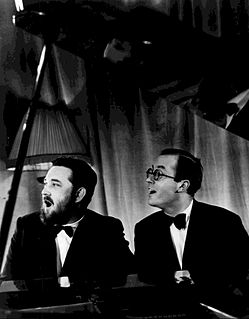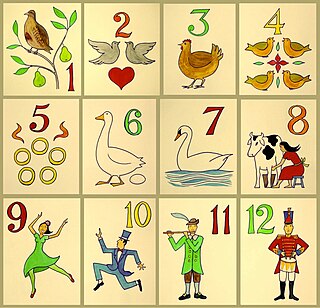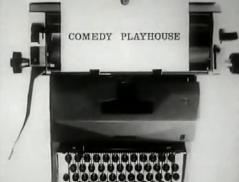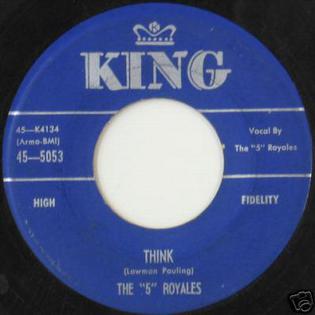
Rockall is an uninhabitable granite islet situated in the North Atlantic Ocean. The United Kingdom claims that Rockall lies within its exclusive economic zone (EEZ) and is part of its territory, but this claim is not recognised by its neighbours.
Beyond Our Ken (1958–64) was a radio comedy programme, the predecessor to Round the Horne (1965–68). Both programmes starred Kenneth Horne, Kenneth Williams, Hugh Paddick, Betty Marsden and Bill Pertwee, with announcer Douglas Smith. Musical accompaniment was provided by the BBC Revue Orchestra. The title is a pun on the first name Kenneth, which hinges on the familiar expression 'beyond our ken'.

Flanders and Swann were a British comedy duo. Lyricist, actor and singer Michael Flanders (1922–1975) and composer and pianist Donald Swann (1923–1994) collaborated in writing and performing comic songs. They first worked together in a school revue in 1939 and eventually wrote more than 100 comic songs together.

Michael Henry Flanders was an English actor, broadcaster, and writer and performer of comic songs. He is best known for his stage partnership with Donald Swann.

Donald Ibrahím Swann was a Welsh-born composer, musician, singer and entertainer. He was one half of Flanders and Swann, writing and performing comic songs with Michael Flanders.

A cumulative song is a song with a simple verse structure modified by progressive addition so that each verse is longer than the verse before. Cumulative songs are popular for group singing, in part because they require relatively little memorization of lyrics, and because remembering the previous verse to concatenate it to form the current verse can become a kind of game.
A revue is a type of multi-act popular theatrical entertainment that combines music, dance, and sketches. The revue has its roots in 19th century popular entertainment and melodrama but grew into a substantial cultural presence of its own during its golden years from 1916 to 1932. Though most famous for their visual spectacle, revues frequently satirized contemporary figures, news or literature. Similar to the related subforms of operetta and musical theatre, the revue art form brings together music, dance and sketches to create a compelling show. In contrast to these, however, revue does not have an overarching storyline. Rather, a general theme serves as the motto for a loosely-related series of acts that alternate between solo performances and dance ensembles.

Comedy Playhouse is a long-running British anthology series of one-off unrelated sitcoms that aired for 120 episodes from 1961 to 1975. Many episodes later graduated to their own series, including Steptoe and Son, Meet the Wife, Till Death Us Do Part, All Gas and Gaiters, Up Pompeii!, Not in Front of the Children, Me Mammy, That's Your Funeral, The Liver Birds, Are You Being Served? and Last of the Summer Wine, which is the world's longest running sitcom, having run from January 1973 to August 2010.

"The Gnu" is a humorous song about a talking gnu by Flanders and Swann.

Max Adrian was an Irish stage, film and television actor and singer. He was a founding member of both the Royal Shakespeare Company and the National Theatre.
"There's a Hole in My Bucket" is a children's song, based on a dialogue between two characters, called Henry and Liza, about a leaky bucket. The song describes a "deadlock" situation: Henry has a leaky bucket, and Liza tells him to repair it. To fix the leaky bucket, he needs straw. To cut the straw, he needs an axe. To sharpen the axe, he needs to wet the sharpening stone. To wet the stone, he needs water. But to fetch water, he needs the bucket, which has a hole in it. In honour of the song, people celebrate National Hole in My Bucket Day on May 30 every year.
"The Parting Glass" is a Scottish traditional song, often sung at the end of a gathering of friends. It has also long been sung in Ireland, enjoying considerable popularity to this day and strongly influencing the style in which it is often now sung. It was purportedly the most popular parting song sung in Scotland before Robert Burns wrote "Auld Lang Syne".

At the Drop of a Hat is a musical revue by Flanders and Swann, described by them as "an after-dinner farrago". In the show, they both sang on a nearly bare stage, accompanied by Swann on the piano. The songs were linked by contemporary social commentary, mostly by Flanders. After a long London run the show played in the US, Switzerland, and on tour in Britain.
The Lord Chamberlain's requirements were a set of four prerequisites for a licence for a production in British theatres. These were printed in theatre programmes so the audience could be aware of them. The Lord Chamberlain's Office had control of theatres until 1968, including censorship of the production content as well as for logistical matters. In the 1980s, they were replaced by similar requirements applied by a local licensing authority.

"Think" is a rhythm and blues song written by Lowman Pauling and originally recorded by his group The "5" Royales. Released as a single on King Records in 1957, it was a national hit and reached number nine on the U.S. R&B chart.

At the Drop of Another Hat is a musical revue by Flanders and Swann, similar in format to its long-running predecessor, At the Drop of a Hat (1956). In the show, they both sang on a nearly bare stage, accompanied by Swann on the piano. The songs were linked by contemporary social commentary, mostly by Flanders. Highlights included "Ill Wind", in which Flanders sings rapidly about a pilfered horn to the tune of the Rondo from Mozart's Horn Concerto No. 4 and "New Built Up Area", a soliloquy by Flanders in which a disgruntled resident of Salisbury Plain complains of the newly erected Stonehenge.
The national anthem of England is usually taken to be the same as that of the United Kingdom as a whole—"God Save the Queen", but in 2016 some MPs felt that England should have its own distinct anthem with the result that there have been discussions on the subject in the UK Parliament. There are a number of songs which may fulfil this role. Several candidate songs have been discussed, including "Jerusalem", "I Vow to Thee, My Country" and "Land of Hope and Glory". Alternatives to "God Save the Queen" have been used for England teams at sporting events.
"Song to the Siren" is a song written by Tim Buckley and his writing partner Larry Beckett and was released by Buckley on his 1970 album Starsailor. It was also later released on Morning Glory: The Tim Buckley Anthology, the album featuring a performance of the song taken from the final episode of The Monkees TV show which aired on March 25, 1968.
Airs on a Shoestring was a British musical revue, first staged at the Royal Court Theatre in London on 22 April 1953.
"Say It with Music" is a popular song written by Irving Berlin. It was introduced in the Music Box Revue of 1921, where it was the de facto theme song and sung as a duet. The song was popularised by Paul Whiteman and His Orchestra on 30 August 1921; this recording debuted on the charts on 12 November of that year, remained there for 14 weeks and peaked at number 1. Other popular versions in 1921/22 were by John Steel and by Ben Selvin.







